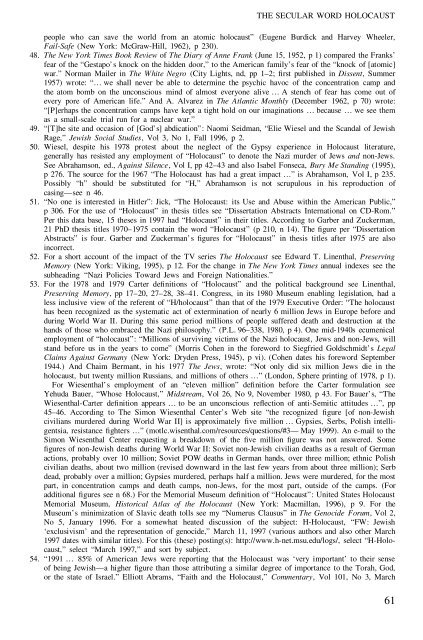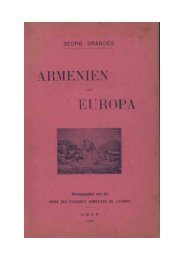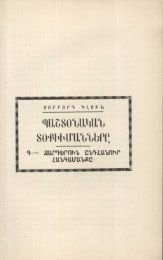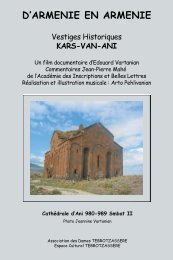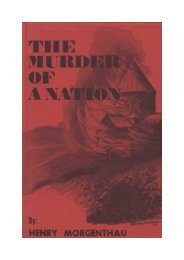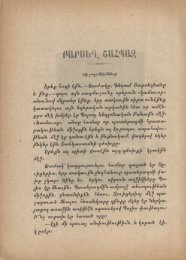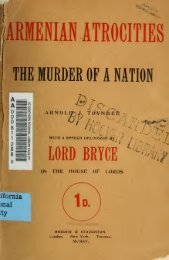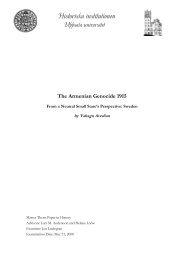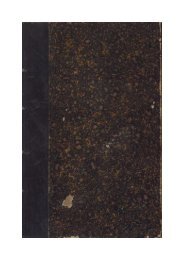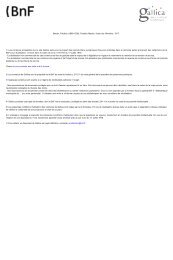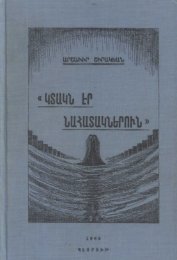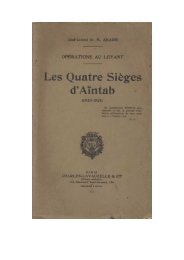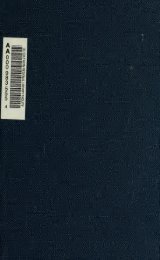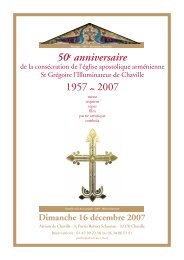The secular word HOLOCAUST: scholarly myths, history, and 20th ...
The secular word HOLOCAUST: scholarly myths, history, and 20th ...
The secular word HOLOCAUST: scholarly myths, history, and 20th ...
Create successful ePaper yourself
Turn your PDF publications into a flip-book with our unique Google optimized e-Paper software.
THE SECULAR WORD <strong>HOLOCAUST</strong>people who can save the world from an atomic holocaust” (Eugene Burdick <strong>and</strong> Harvey Wheeler,Fail-Safe (New York: McGraw-Hill, 1962), p 230).48. <strong>The</strong> New York Times Book Review of <strong>The</strong> Diary of Anne Frank (June 15, 1952, p 1) compared the Franks’fear of the “Gestapo’s knock on the hidden door,” to the American family’s fear of the “knock of [atomic]war.” Norman Mailer in <strong>The</strong> White Negro (City Lights, nd, pp 1–2; rst published in Dissent, Summer1957) wrote: “… we shall never be able to determine the psychic havoc of the concentration camp <strong>and</strong>the atom bomb on the unconscious mind of almost everyone alive … A stench of fear has come out ofevery pore of American life.” And A. Alvarez in <strong>The</strong> Atlantic Monthly (December 1962, p 70) wrote:“[P]erhaps the concentration camps have kept a tight hold on our imaginations … because … we see themas a small-scale trial run for a nuclear war.”49. “[T]he site <strong>and</strong> occasion of [God’s] abdication”: Naomi Seidman, “Elie Wiesel <strong>and</strong> the Sc<strong>and</strong>al of JewishRage,” Jewish Social Studies, Vol 3, No 1, Fall 1996, p 2.50. Wiesel, despite his 1978 protest about the neglect of the Gypsy experience in Holocaust literature,generally has resisted any employment of “Holocaust” to denote the Nazi murder of Jews <strong>and</strong> non-Jews.See Abrahamson, ed., Against Silence, Vol I, pp 42–43 <strong>and</strong> also Isabel Fonseca, Bury Me St<strong>and</strong>ing (1995),p 276. <strong>The</strong> source for the 1967 “<strong>The</strong> Holocaust has had a great impact …” is Abrahamson, Vol I, p 235.Possibly “h” should be substituted for “H,” Abrahamson is not scrupulous in his reproduction ofcasing—see n 46.51. “No one is interested in Hitler”: Jick, “<strong>The</strong> Holocaust: its Use <strong>and</strong> Abuse within the American Public,”p 306. For the use of “Holocaust” in thesis titles see “Dissertation Abstracts International on CD-Rom.”Per this data base, 15 theses in 1997 had “Holocaust” in their titles. According to Garber <strong>and</strong> Zuckerman,21 PhD thesis titles 1970–1975 contain the <strong>word</strong> “Holocaust” (p 210, n 14). <strong>The</strong> gure per “DissertationAbstracts” is four. Garber <strong>and</strong> Zuckerman’s gures for “Holocaust” in thesis titles after 1975 are alsoincorrect.52. For a short account of the impact of the TV series <strong>The</strong> Holocaust see Edward T. Linenthal, PreservingMemory (New York: Viking, 1995), p 12. For the change in <strong>The</strong> New York Times annual indexes see thesubheading “Nazi Policies Toward Jews <strong>and</strong> Foreign Nationalities.”53. For the 1978 <strong>and</strong> 1979 Carter de nitions of “Holocaust” <strong>and</strong> the political background see Linenthal,Preserving Memory, pp 17–20, 27–28, 38–41. Congress, in its 1980 Museum enabling legislation, had aless inclusive view of the referent of “H/holocaust” than that of the 1979 Executive Order: “<strong>The</strong> holocausthas been recognized as the systematic act of extermination of nearly 6 million Jews in Europe before <strong>and</strong>during World War II. During this same period millions of people suffered death <strong>and</strong> destruction at theh<strong>and</strong>s of those who embraced the Nazi philosophy.” (P.L. 96–338, 1980, p 4). One mid-1940s ecumenicalemployment of “holocaust”: “Millions of surviving victims of the Nazi holocaust, Jews <strong>and</strong> non-Jews, willst<strong>and</strong> before us in the years to come” (Morris Cohen in the fore<strong>word</strong> to Siegfried Goldschmidt’s LegalClaims Against Germany (New York: Dryden Press, 1945), p vi). (Cohen dates his fore<strong>word</strong> September1944.) And Chaim Bermant, in his 1977 <strong>The</strong> Jews, wrote: “Not only did six million Jews die in theholocaust, but twenty million Russians, <strong>and</strong> millions of others …” (London, Sphere printing of 1978, p 1).For Wiesenthal’s employment of an “eleven million” de nition before the Carter formulation seeYehuda Bauer, “Whose Holocaust,” Midstream, Vol 26, No 9, November 1980, p 43. For Bauer’s, “<strong>The</strong>Wiesenthal-Carter de nition appears … to be an unconscious re ection of anti-Semitic attitudes …”, pp45–46. According to <strong>The</strong> Simon Wiesenthal Center’s Web site “the recognized gure [of non-Jewishcivilians murdered during World War II] is approximately ve million … Gypsies, Serbs, Polish intelligentsia,resistance ghters …” (motlc.wisenthal.com/resources/questions/#3— May 1999). An e-mail to theSimon Wiesenthal Center requesting a breakdown of the ve million gure was not answered. Some gures of non-Jewish deaths during World War II: Soviet non-Jewish civilian deaths as a result of Germanactions, probably over 10 million; Soviet POW deaths in German h<strong>and</strong>s, over three million; ethnic Polishcivilian deaths, about two million (revised downward in the last few years from about three million); Serbdead, probably over a million; Gypsies murdered, perhaps half a million. Jews were murdered, for the mostpart, in concentration camps <strong>and</strong> death camps, non-Jews, for the most part, outside of the camps. (Foradditional gures see n 68.) For the Memorial Museum de nition of “Holocaust”: United States HolocaustMemorial Museum, Historical Atlas of the Holocaust (New York: Macmillan, 1996), p 9. For theMuseum’s minimization of Slavic death tolls see my “Numerus Clausus” in <strong>The</strong> Genocide Forum, Vol 2,No 5, January 1996. For a somewhat heated discussion of the subject: H-Holocaust, “FW: Jewish‘exclusivism’ <strong>and</strong> the representation of genocide,” March 11, 1997 (various authors <strong>and</strong> also other March1997 dates with similar titles). For this (these) posting(s): http://www.h-net.msu.edu/logs/, select “H-Holocaust,”select “March 1997,” <strong>and</strong> sort by subject.54. “1991 … 85% of American Jews were reporting that the Holocaust was ‘very important’ to their senseof being Jewish—a higher gure than those attributing a similar degree of importance to the Torah, God,or the state of Israel.” Elliott Abrams, “Faith <strong>and</strong> the Holocaust,” Commentary, Vol 101, No 3, March61


